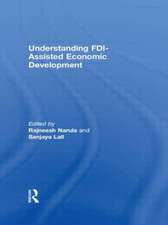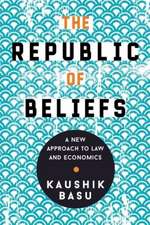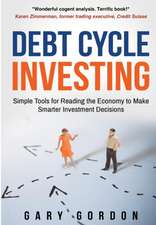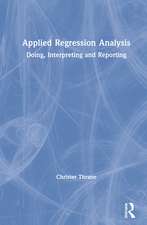Keynes Against Capitalism: His Economic Case for Liberal Socialism: Economics as Social Theory
Autor James Crottyen Limba Engleză Hardback – 14 mai 2019
Tracing the evolution of Keynes’s views on policy from WWI until his death in 1946, Crotty argues that virtually all post-WWII "Keynesian" economists misinterpreted crucial parts of Keynes’s economic theory, misunderstood many of his policy views, and failed to realize that his overarching political objective was not to save British capitalism, but rather to replace it with Liberal Socialism. This book shows how Keynes’s Liberal Socialism began to take shape in his mind in the mid-1920s, evolved into a more concrete institutional form over the next decade or so, and was laid out in detail in his work on postwar economic planning at Britain’s Treasury during WWII. Finally, it explains how The General Theory provided the rigorous economic theoretical foundation needed to support his case against capitalism in support of Liberal Socialism.
Offering an original and highly informative exposition of Keynes’s work, this book should be of great interest to teachers and students of economics. It should also appeal to a general audience interested in the role the most important economist of the 20th century played in developing the case against capitalism and in support of Liberal Socialism. Keynes Against Capitalism is especially relevant in the context of today’s global economic and political crises.
| Toate formatele și edițiile | Preț | Express |
|---|---|---|
| Paperback (1) | 377.66 lei 6-8 săpt. | |
| Taylor & Francis – 13 mai 2019 | 377.66 lei 6-8 săpt. | |
| Hardback (1) | 1016.52 lei 6-8 săpt. | |
| Taylor & Francis – 14 mai 2019 | 1016.52 lei 6-8 săpt. |
Din seria Economics as Social Theory
-
 Preț: 279.86 lei
Preț: 279.86 lei - 15%
 Preț: 543.23 lei
Preț: 543.23 lei - 8%
 Preț: 441.24 lei
Preț: 441.24 lei -
 Preț: 356.10 lei
Preț: 356.10 lei -
 Preț: 295.82 lei
Preț: 295.82 lei -
 Preț: 428.09 lei
Preț: 428.09 lei - 18%
 Preț: 1436.89 lei
Preț: 1436.89 lei - 15%
 Preț: 419.81 lei
Preț: 419.81 lei - 26%
 Preț: 354.65 lei
Preț: 354.65 lei - 15%
 Preț: 426.70 lei
Preț: 426.70 lei - 15%
 Preț: 470.87 lei
Preț: 470.87 lei -
 Preț: 377.66 lei
Preț: 377.66 lei -
 Preț: 478.03 lei
Preț: 478.03 lei -
 Preț: 417.20 lei
Preț: 417.20 lei - 15%
 Preț: 576.47 lei
Preț: 576.47 lei - 43%
 Preț: 207.05 lei
Preț: 207.05 lei - 26%
 Preț: 766.31 lei
Preț: 766.31 lei -
 Preț: 532.58 lei
Preț: 532.58 lei - 15%
 Preț: 430.45 lei
Preț: 430.45 lei - 30%
 Preț: 850.99 lei
Preț: 850.99 lei - 15%
 Preț: 456.21 lei
Preț: 456.21 lei - 15%
 Preț: 422.26 lei
Preț: 422.26 lei - 15%
 Preț: 458.59 lei
Preț: 458.59 lei - 15%
 Preț: 470.85 lei
Preț: 470.85 lei - 26%
 Preț: 1217.42 lei
Preț: 1217.42 lei - 18%
 Preț: 1672.42 lei
Preț: 1672.42 lei - 30%
 Preț: 1017.37 lei
Preț: 1017.37 lei - 15%
 Preț: 515.60 lei
Preț: 515.60 lei - 27%
 Preț: 251.80 lei
Preț: 251.80 lei - 18%
 Preț: 1000.27 lei
Preț: 1000.27 lei - 18%
 Preț: 1282.67 lei
Preț: 1282.67 lei - 15%
 Preț: 463.49 lei
Preț: 463.49 lei - 15%
 Preț: 478.96 lei
Preț: 478.96 lei - 18%
 Preț: 1273.35 lei
Preț: 1273.35 lei
Preț: 1016.52 lei
Preț vechi: 1239.65 lei
-18% Nou
Puncte Express: 1525
Preț estimativ în valută:
194.57€ • 211.42$ • 163.55£
194.57€ • 211.42$ • 163.55£
Carte tipărită la comandă
Livrare economică 21 aprilie-05 mai
Preluare comenzi: 021 569.72.76
Specificații
ISBN-13: 9781138612839
ISBN-10: 1138612839
Pagini: 410
Dimensiuni: 156 x 234 x 24 mm
Greutate: 0.92 kg
Ediția:1
Editura: Taylor & Francis
Colecția Routledge
Seria Economics as Social Theory
Locul publicării:Oxford, United Kingdom
ISBN-10: 1138612839
Pagini: 410
Dimensiuni: 156 x 234 x 24 mm
Greutate: 0.92 kg
Ediția:1
Editura: Taylor & Francis
Colecția Routledge
Seria Economics as Social Theory
Locul publicării:Oxford, United Kingdom
Public țintă
Postgraduate and UndergraduateCuprins
1. Introduction: was Keynes Trying to Save Capitalism or Create "Liberal Socialism"?. Part I: From The Economic Consequences of the Peace to The General Theory. 2. The Economic Consequences of the Peace: 1919. 3. Making Sense of Chaos: 1919–1923. 4. Public Investment and State Planning in 1924: The Real Keynesian Revolution Begins. 5. The Return to Gold in 1925: Deflation, Social Justice, and Class Struggle. 6. Three Important "Essays in Persuasion" on the Proper Economic Role of the State: 1925–1926. 7. Destructive Competition, Corporatism, Industrial Policy, and the New Economic Role of the State: 1927–1928. 8. Britain’s Industrial Future and the Board of National Investment: A Detailed Analysis of the Institutions to Be Used by the State to Regulate Capital Accumulation in Pursuit of Full Employment under Liberal Socialism. 9. On the Edge of the Great Depression: Keynes Continues His Efforts to Gain Political Support for the Radical Policies in Britain’s Industrial Future. 10. Keynes on "Insane" Financial Markets and the Emergence of Stagnation in the USA in the Early 1930s. 11. National Self-Sufficiency: 1933. Part II: The General Theory: The Ultimate Defense in Theory of Keynes’s Radical Policy Agenda. 12. Methodology and Ideology: Keynes Versus the Classicists. 13. The Priority of High-Unemployment Long-Run Equilibrium or "Secular Stagnation" in The General Theory. 14. Upon Further Reflection: Keynes on Secular Stagnation in 1937. 15. Keynes Versus the Classicists on the Effects of Wage and Price Deflation. 16. Keynes Versus the Classicists on Disequilibrium Processes in the Bond Market. 17. Chapter 12 of The General Theory: The "Insane" Stock Market, Capital Investment, and Instability. 18. The Theory of the Business Cycle in Chapter 22: Integrating the Profit Rate and the Bond and Stock Markets in a Theory of Financial and Economic Instability. 19. Are the "Models" Keynes Created in The General Theory Compatible with the IS/LM Interpretation of the Book: A Digression. 20. Keynes’s Radical Policy Views in The General Theory. Part III: State Planning, Public Investment, and Liberal Socialism After The General Theory. 21. From The General Theory Until Britain Entered WWII: 1936–1939. 22. Keynes and Government Postwar Economic Planning for "Liberal Socialism" During the War: 1939–1945. 23. Thoughts on the Relevance of Keynes’s Work to Solving Today’s Economic Problems: The Society–Economy Nexus, Methodology, Theory, and Policy. References. Index
Notă biografică
James Crotty is Emeritus Professor of Economics at the University of Massachusetts Amherst and Senior Research Associate at the Political Economy Research Institute. His research in theory and policy attempts to integrate the complementary analytical strengths of the Marxian and Keynesian traditions.
Recenzii
"A huge value of the book is that it differentiates the messages of Keynes’s original work from modern-day “Keynesians.” Crotty shows that the IS-LM incarnation of Keynes captured very little of Keynes’s beliefs and left out the most important parts of his thought...There is hope that the macroeconomics discipline might finally be catching on to Keynes’s relentless insistence that the assumptions of any model must be applicable to the real-world." Amanda Page-Hoongrajok, Phenomenal World blog
"This book is a marvel of economic narrative, with Crotty's clarity and Keynes's elegance in stunning counterpoint, from Versailles through the Depression to the war and Bretton Woods, all bringing forth the great, neglected fact that Keynes's Liberal Socialism was far more radical than modern memory would have us think.", James K. Galbraith, Lloyd M. Bentsen, Jr. Chair in Government/Business Relations, University of Texas at Austin
"James Crotty’s writings have always been marked by deep thought and analysis, independence of mind, a judicious amalgamation of theory and empirical evidence and humane and realistic policies. The present volume is characterised by all these traits, it is vintage Crotty. The author makes a convincing case that Keynes since The Economic Consequences of Peace (1919) has been developing his ideas on liberal socialism that highlight the centrality of planning and public investment in sustaining full employment, ideas that came to full maturity in The General Theory and Keynes’s writings and activities after its publication, in World War II and up to his death in April 1946. Crotty’s arguments undermine the conventional wisdom of Keynesians and non-Keynesians alike that Keynes’s aim was to save capitalism from itself and should be required reading for professional economists of all persuasions, policy makers, and concerned citizens appalled by the economic and political malaise we currently find ourselves in.", Geoffrey Harcourt, Emeritus Reader in The History of Economic Theory, Cambridge, Honorary Professor UNSW, Sydney
"This bold and brilliant work revolutionizes our understanding of Keynes’ economics. Instead of reopening the often-debated topic of the essential characteristics of ‘Keynesian economics,’ James Crotty puts Keynes’ lectures and writings into the context of both the economists and politicians with whom he interacted and of his political and policy engagements. Focusing on the moving pulse of Keynes’ ideas from 1919 through his death in 1946, the author traces the evolution of his profound and extensive vision: achieving a sustainable future for capitalism cannot be left to market forces, but must be managed through public investment and of socialist planning and coordination. This book’s provocative approach is perfectly timed for broad rethinking of macroeconomics that is now underway. In the density and originality of its themes, and in the integrity and depth of its scholarship, the reader is left in little doubt that this is the work of a master.", Gary A. Dymski, Professor of Applied Economics, Leeds University Business School, University of Leeds
"Regardless of whether you share Crotty’s revisionist framing of Keynes’ overarching vision, this smart, erudite and illuminating book is steeped in the enduring wisdom of its subject, and shines a powerful light on the fundamental differences between the economics of Keynes and practice of postwar "Keynesianism" – a distinction of pressing relevance for today’s economic challenges.", Jonathan David Kirshner, Stephen and Barbara Friedman Professor of International Political Economy, Department of Government, Cornell University
"James Crotty has written an outstanding description of the evolution of Keynes’s thought on the role of State involvement in a capitalism that promotes full employment and fairness. Characterisations of Keynesian economics by policy-makers and academics runs far afield from the clarity of purpose that Keynes held when describing the working of a capitalist economy. Crotty, in this clear and well written book, has surely set the record straight.", Professor Roy Rotheim, Skidmore College, USA
"This book is a marvel of economic narrative, with Crotty's clarity and Keynes's elegance in stunning counterpoint, from Versailles through the Depression to the war and Bretton Woods, all bringing forth the great, neglected fact that Keynes's Liberal Socialism was far more radical than modern memory would have us think.", James K. Galbraith, Lloyd M. Bentsen, Jr. Chair in Government/Business Relations, University of Texas at Austin
"James Crotty’s writings have always been marked by deep thought and analysis, independence of mind, a judicious amalgamation of theory and empirical evidence and humane and realistic policies. The present volume is characterised by all these traits, it is vintage Crotty. The author makes a convincing case that Keynes since The Economic Consequences of Peace (1919) has been developing his ideas on liberal socialism that highlight the centrality of planning and public investment in sustaining full employment, ideas that came to full maturity in The General Theory and Keynes’s writings and activities after its publication, in World War II and up to his death in April 1946. Crotty’s arguments undermine the conventional wisdom of Keynesians and non-Keynesians alike that Keynes’s aim was to save capitalism from itself and should be required reading for professional economists of all persuasions, policy makers, and concerned citizens appalled by the economic and political malaise we currently find ourselves in.", Geoffrey Harcourt, Emeritus Reader in The History of Economic Theory, Cambridge, Honorary Professor UNSW, Sydney
"This bold and brilliant work revolutionizes our understanding of Keynes’ economics. Instead of reopening the often-debated topic of the essential characteristics of ‘Keynesian economics,’ James Crotty puts Keynes’ lectures and writings into the context of both the economists and politicians with whom he interacted and of his political and policy engagements. Focusing on the moving pulse of Keynes’ ideas from 1919 through his death in 1946, the author traces the evolution of his profound and extensive vision: achieving a sustainable future for capitalism cannot be left to market forces, but must be managed through public investment and of socialist planning and coordination. This book’s provocative approach is perfectly timed for broad rethinking of macroeconomics that is now underway. In the density and originality of its themes, and in the integrity and depth of its scholarship, the reader is left in little doubt that this is the work of a master.", Gary A. Dymski, Professor of Applied Economics, Leeds University Business School, University of Leeds
"Regardless of whether you share Crotty’s revisionist framing of Keynes’ overarching vision, this smart, erudite and illuminating book is steeped in the enduring wisdom of its subject, and shines a powerful light on the fundamental differences between the economics of Keynes and practice of postwar "Keynesianism" – a distinction of pressing relevance for today’s economic challenges.", Jonathan David Kirshner, Stephen and Barbara Friedman Professor of International Political Economy, Department of Government, Cornell University
"James Crotty has written an outstanding description of the evolution of Keynes’s thought on the role of State involvement in a capitalism that promotes full employment and fairness. Characterisations of Keynesian economics by policy-makers and academics runs far afield from the clarity of purpose that Keynes held when describing the working of a capitalist economy. Crotty, in this clear and well written book, has surely set the record straight.", Professor Roy Rotheim, Skidmore College, USA
Descriere
It is almost universally believed that Keynes wrote his magnum opus, The General Theory of Employment, Interest and Money to save capitalism from the socialist, communist, and fascist forces that were rising up during the Great Depression era. On the contrary, this book argues that this was not the case with respect to socialism.

















